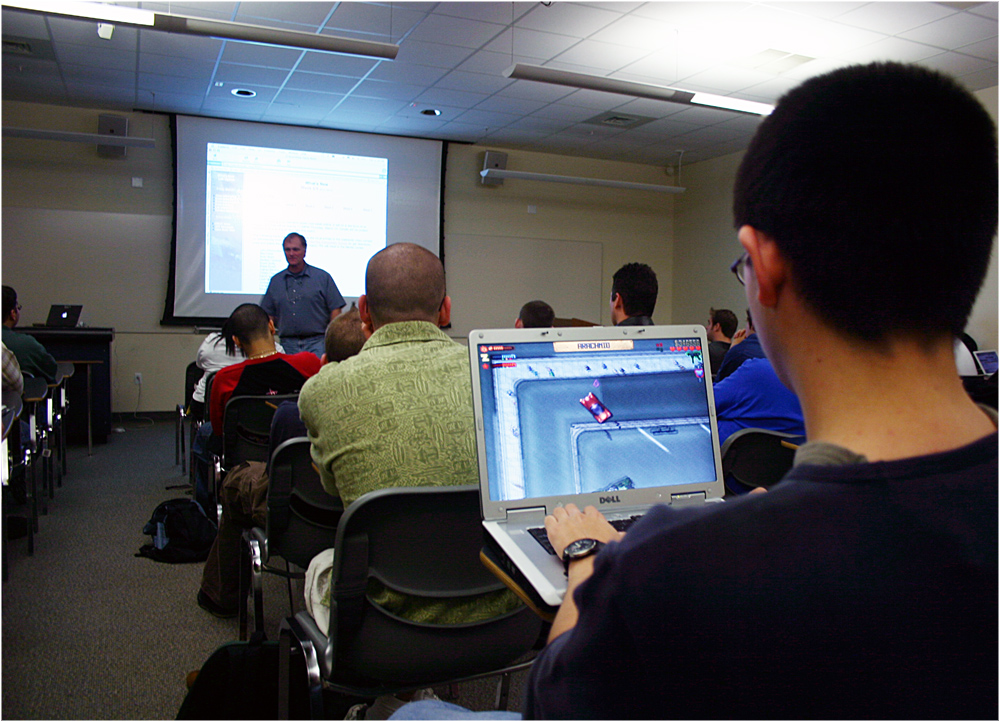This page is for students and faculty weighing the pros and cons of using laptop computers to take notes during lectures.
Laptops cause lower grades
Most students who use laptops to take notes during lecture are fully convinced that doing so will help them do better in class. Randomized, controlled experiments, however, show the opposite is true (Mueller and Oppenheimer 2014, Hembrooke and Gay 2013). The usual explanation behind the drop in performance is that students are distracted by multitasking — students believe that they can effectively absorb lecture material while also keeping an eye on the emails, texts, etc. Students don’t perceive that they are paying less and less attention to the teacher. It’s also the case that some lecture material is fundamentally visual and students simply cannot transcribe that into text.
Laptops distract other students
But laptop use does not just reduce a student’s learning, it can do the same to students sitting nearby (Sana et al. 2012). One source of the distraction is visual — students sitting behind laptop users are often transfixed by what the student is doing. I’ve witnessed students play movies during lectures, for example, and nearby students simply couldn’t look away. Another distraction to students nearby is the noise — some people find keyboard clatter and mouse clicks just as annoying as listening to somebody chew gum or compulsively click a pen. One study revealed that 20% of undergraduates suffer from misophonia.
Laptops can reduce your fertility
Aside from the pedagogical reasons why laptops might be bad, there’s a physiological one, too — the heat produced by laptops might cause a drop in sperm count. Just like skinny jeans.
Laptops are indispensable for some students
One important reason for allowing laptop use is that they can be extremely helpful to some students. E.g., a visual or other disability might prevent somebody from writing as quickly as they can type. And a professor who banned laptops but allowed students with accommodations to use them would create a situation in which disabled students are outed as such, and that’s not good.
Tips
- I think the most important thing an educator should do is mention that laptop use can lead to lower engagement with the material and lower grades. I.e., at least make the pitch to students who might not be aware of this fact. Many professors are not even aware of this fact.
- I think it’s also good to encourage laptop users to sit in the back if they are inclined to check email, watch videos, or respond to text messages during lecture. Similarly, mention to the class that sitting next to somebody with a laptop could be distracting even if a student doesn’t perceive it to be distracting.
- Another consideration is to encourage use of laptop brands that don’t make so much keyboard noise. You can’t ask students to buy quieter ones, of course, but if they are in the market it wouldn’t hurt to mention that such computers exist. Here’s a YouTube video that discusses loud keyboards on laptops. There are hundreds of other reviews.
- Teachers should also include their laptop guidelines on the syllabus so that students don’t need to guess.
Some literature
Cole, D. 2007. Laptops vs learning. Washington Post April 7. link
Dynarski, S. 2017. Laptops are great. But not during a lecture or a meeting. New York Times Nov 22. link
Fried, C.B. 2008. In-class laptop use and its effects on student learning. Computers & Education 50:906-914. link
Hembrooke, H., and G. Gay. 2003. The laptop and the lecture: the effects of multitasking on learning environments. Journal of Computing in Higher Education 15:46-64. link
Sheynkin, Y., et al. 2004. Increase in scrotal temperature in laptop computer users. Human Reproduction 20:452-455. link
Thagard, P. 2010. Banning laptops in classrooms. Psychology Today Blog. July 9, 2010. link
Timmer, J. 2009. In-class laptop use sparks backlash, possibly lower grades. Nobel Intent blog @ Ars Technica, March 16. link
If you need more, run this search.

